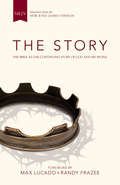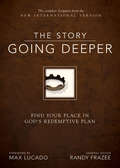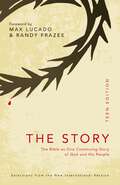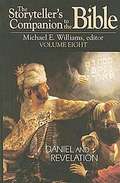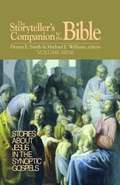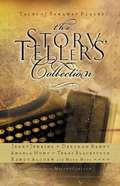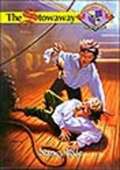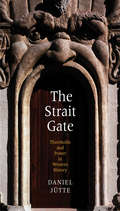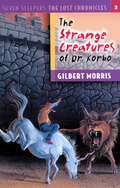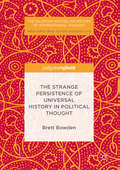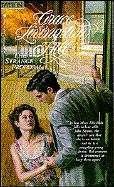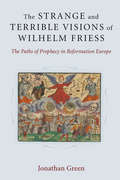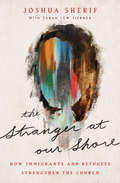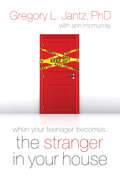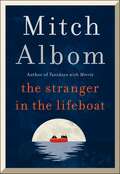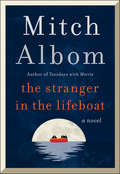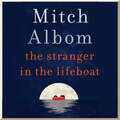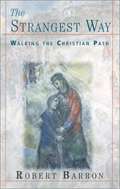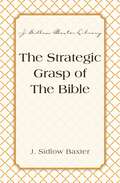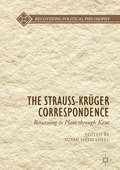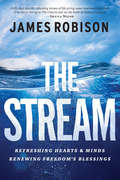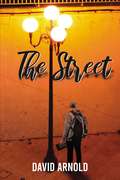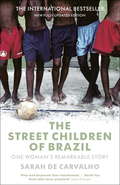- Table View
- List View
The Story, NKJV: The Bible as One Continuing Story of God and His People
by Max Lucado Randy Frazee“THE GREATEST STORY EVER TOLD” IS MORE THAN JUST A CLICHÉ. God goes to great lengths to rescue lost and hurting people. That is what The Story is all about: the story of the Bible, God’s great love affair with humanity. Condensed into 31 accessible chapters, The Story sweeps you into the unfolding progression of Bible characters and events from Genesis to Revelation. Using the classic, yet updated text of the New King James Version Bible, it allows the stories, poems, and teachings of the Bible to read like a novel. And like any good story, The Story is filled with intrigue, drama, conflict, romance, and redemption; and this story’s true! From the foreword by Max Lucado and Randy Frazee: “This book tells the grandest, most compelling story of all time: the story of a true God who loves his children, who established for them a way of salvation and provided a route to eternity. Each story in these 31 chapters reveals the God of grace—the God who speaks; the God who acts; the God who listens; the God whose love for his people culminated in his sacrifice of Jesus, his only Son, to atone for the sins of humanity.” Features: • The story of the Bible—in its own words. Selections from the NIV Bible with short transitions to connect the reader to the continuing story. • Events, characters, and teachings of the Bible arranged chronologically • Timelines of Bible events • New King James Bible text Church families around the globe can now embrace The Story for a full ministry year through worship services, small group studies, and family activities. Learn more about this whole-church experience at TheStory.com. An excerpt from The Story: After Judas left, Jesus gave the disciples a glimpse of what was to come. He foreshadowed the fact that he was going to be “broken” and “poured out”—he was going to take humanity’s punishment for sin on himself. While they were eating, Jesus took bread, and when he had given thanks, he broke it and gave it to his disciples, saying, “Take and eat; this is my body.” Then he took a cup, and when he had given thanks, he gave it to them, saying, “Drink from it, all of you. This is my blood of the covenant, which is poured out for many for the forgiveness of sins. I tell you, I will not drink from this fruit of the vine from now on until that day when I drink it new with you in my Father’s kingdom.” Jesus warned his disciples that he would be with them only a little while longer. He went on to comfort his confused followers. “Do not let your hearts be troubled. You believe in God; believe also in me. My Father’s house has many rooms; if that were not so, would I have told you that I am going there to prepare a place for you? And if I go and prepare a place for you, I will come back and take you to be with me that you also may be where I am. You know the way to the place where I am going.” Thomas said to him, “Lord, we don’t know where you are going, so how can we know the way?” Jesus answered, “I am the way and the truth and the life. No one comes to the Father except through me. If you really know me, you will know my Father as well. From now on, you do know him and have seen him.”
The Story: Find Your Place in God's Redemptive Plan
by Max Lucado Randy FrazeeHow do you live out God’s redemptive story in everyday life? It can seem hard to do – how to first connect the pieces and stories of the Bible with your life and then to apply them and live them out through your actions, words, and thoughts. Yet your life is connected to every other story in history and the God who loves you. The Story: Going Deeper reveals this connection through insights into the Bible’s stories about God and his people. Pick up this NIV Bible today, and discover how the sweeping saga of God’s redemptive story transforms your story.
The Story: The Bible as One Continuing Story of God and His People
by Zondervan“The Greatest Story Ever Told” is more than just a cliché. God has gone to great lengths to rescue lost and hurting people. That is what The Story for Teens is all about—the story of the Bible, God’s great love affair with humanity. Condensed into 31 accessible chapters, The Story for Teens sweeps you into the unfolding progression of Bible characters and events from Genesis to Revelation. Using the clear, accurate, and easy-to-understand text of the New International Version, it allows the stories, poems, and teachings of the Bible to read like a novel. And like any good story, it is filled with intrigue, drama, conflict, romance, and redemption. Features: • The story of the Bible … in its own words • Events, characters, and teachings of the Bible arranged chronologically • New International Version text
The Storyteller's Companion to the Bible Volume 8: Daniel and Revelation
by Michael E. Williams Rick Lowery Fred A. ShawThe stories in Daniel and Revelation are among the most vivid in the Bible, but they are also among the most misunderstood. In The Storyteller's Companion to the Bible Volume 8, commentator Rick Lowery and storytellers Michael E. Willliams and Fred A. Shaw show how the symbolism and imagery of these biblical stories offer comfort in times of distress and encouragement to hold fast in faith.
The Storyteller's Companion to the Bible Volume 9
by Michael E. Williamssubscription item for Ministry Matters
The Storytellers' Collection: Tales From Faraway Places
by Melody CarlsonTravel to Paris, London, Moscow, Senegal, and beyond in this wonderful collection of short stories penned by your favorite authors! Best-selling contributors include Robin Jones Gunn, Jerry Jenkins, Neta Jackson, Karen Kingsbury, Tracie Peterson, Lauraine Snelling, and others. No passport required ... just a comfortable reading chair!
The Stowaway
by Nancy RueBook 2 in the Christian Heritage Series, The Salem Years. Josiah encounters a tough orphan whose evil schemes could get both Josiah and Hope in a heap of trouble. How will they prove their innocence?
The Strait Gate
by Daniel JütteExploring a chapter not yet probed in the cultural history of the West, The Strait Gate demonstrates how doors, gates, and related technologies such as the key and the lock have shaped the way we perceive and navigate the domestic and urban spaces that surround us in our everyday lives. Jütte reveals how doors have served as sites of power, exclusion, and inclusion--and, by extension, as metaphors for salvation--in the course of Western history. This book makes it clear that doors, more than any other parts of the house, are the objects onto which we project our ideas of and anxieties about security, privacy, and shelter. Without doors, of course, houses could not exist. But even though we each walk through doorways well over a hundred times a day, we typically pay little attention to the doors we encounter. We regard them simply as a means of entering or leaving a building or room. Yet when our doors stop working as they should--when we find that we cannot lock or open them, for instance--we react with discomfort and anxiety. Drawing on a wide range of archival, literary, and visual sources, as well as on research literature across various disciplines and languages, Jütte pays particular attention to the history of the practices that have developed over the centuries in order to handle and control doors in everyday life.
The Strange Creatures of Dr. Korbo (Seven Sleepers: The Lost Chronicles #3)
by Gilbert MorrisThe Seven Sleepers have seen their share of strange animals in Nuworld. But Josh and his friends have never seen anything like the animals in Dr. Korbo's country. Where did squirrels the size of elephants come from, anyway? Is the evil doctor somehow responsible? God knows how to put his people in the right place at the right time. So when the Sleepers hear what Dr. Korbo plans to do next, they decide to stop him. Follow Josh and company into danger and see what happens.
The Strange Creatures of Dr. Korbo (Seven Sleepers: The Lost Chronicles #3)
by Gilbert MorrisThe Seven Sleepers have seen their share of strange animals in Nuworld. But Josh and his friends have never seen anything like the animals in Dr. Korbo's country. Where did squirrels the size of elephants come from, anyway? Is the evil doctor somehow responsible? God knows how to put his people in the right place at the right time. So when the Sleepers hear what Dr. Korbo plans to do next, they decide to stop him. Follow Josh and company into danger and see what happens.
The Strange Persistence of Universal History in Political Thought
by Brett BowdenThis book explores and explains the reasons why the idea of universal history, a form of teleological history which holds that all peoples are travelling along the same path and destined to end at the same point, persists in political thought. Prominent in Western political thought since the middle of the eighteenth century, the idea of universal history holds that all peoples can be situated in the narrative of history on a continuum between a start and an end point, between the savage state of nature and civilized modernity. Despite various critiques, the underlying teleological principle still prevails in much contemporary thinking and policy planning, including post-conflict peace-building and development theory and practice. Anathema to contemporary ideals of pluralism and multiculturalism, universal history means that not everyone gets to write their own story, only a privileged few. For the rest, history and future are taken out of their hands, subsumed and assimilated into other people's narrative.
The Strange Proposal
by Grace Livingston HillMary Elizabeth Wainwright, carefree daughter of a famous family, had expected to have fun at her cousin’s wedding. What she hadn’t expected, however, was to end up being the maid of honor--or to have John Saxon, the handsome best man she met just before the ceremony, proclaim his love for her during the wedding recessional! Now many forces threaten to pull Mary Elizabeth and John apart: distance, social standing, finances, a lost love letter, belief in God, and a wealthy man who is determined that nothing--and no one--will stop him from claiming Mary Elizabeth as his own...
The Strange and Terrible Visions of Wilhelm Friess: The Paths of Prophecy in Reformation Europe
by Jonathan GreenAlthough nearly forgotten today, the prophetic writing of Wilhelm Friess was the most popular work of its kind in Germany in the second half of the sixteenth century. While the author "Wilhelm Friess" was a convenient fiction, his text had a long and remarkable history as it moved from the papal court in fourteenth-century Avignon, to Antwerp under Habsburg oppression, to Nuremberg as it was still reeling from Lutheran failures in the Schmalkaldic War, and then back to Antwerp at the outbreak of the Dutch revolt. Dutch scholars have recognized that Frans Fraet was executed for printing a prognostication by Willem de Vriese, but this prognostication was thought to be lost. A few scholars of sixteenth-century German apocalypticism have briefly noted the prophecies of Wilhelm Friess but have not studied them in depth. The Strange and Terrible Visions of Wilhelm Friess is the first to connect de Vriese and Friess, as well as recognize the prophecy of Wilhelm Friess as an adaptation of a French version of theVademecum of Johannes de Rupescissa, making these pamphlets by far the most widespread source for Rupescissa's apocalyptic thought in Reformation Germany. The book explains the connection between the first and second prophecies of Wilhelm Friess and discovers the Calvinist context of the second prophecy and its connection to Johann Fischart, one of the most important German writers of the time. Jonathan Green provides a study of how textual history interacts with print history in early modern pamphlets and proposes a model of how early modern prophecies were created and transmitted. The Strange and Terrible Visions of Wilhelm Friess makes important contributions to the study of early modern German and Dutch literature, apocalypticism and confessionalization during the Reformation, and the history of printing in the sixteenth century.
The Stranger at Our Shore: How Immigrants and Refugees Strengthen the Church
by Joshua SherifA gripping tale of escape from Egypt, The Stranger at Our Shore is the true story of one young man&’s journey out of Islam into new life in Christ. Through his remarkable testimony, Chicago pastor Joshua Sherif calls the Western Church to reconsider the plight of the modern day sojourners in our land—the strangers at our shore and the ones living right next door—and to return wholeheartedly to its first charge: making disciples. The book examines three ways believers harden their hearts towards the stranger and suggests three practical remedies to help us begin casting a wider net for discipleship in our communities. Though any reader will be captivated by the powerful story, any believer will walk away from this book feeling less intimidated and better equipped to disciple people who are different than them.
The Stranger at Our Shore: How Immigrants and Refugees Strengthen the Church
by Joshua SherifA gripping tale of escape from Egypt, The Stranger at Our Shore is the true story of one young man&’s journey out of Islam into new life in Christ. Through his remarkable testimony, Chicago pastor Joshua Sherif calls the Western Church to reconsider the plight of the modern day sojourners in our land—the strangers at our shore and the ones living right next door—and to return wholeheartedly to its first charge: making disciples. The book examines three ways believers harden their hearts towards the stranger and suggests three practical remedies to help us begin casting a wider net for discipleship in our communities. Though any reader will be captivated by the powerful story, any believer will walk away from this book feeling less intimidated and better equipped to disciple people who are different than them.
The Stranger in Your House
by Gregory L. JantzBest-selling author Dr. Gregory L. Jantz offers hope and help for parents of teens. Adolescence is a frightening and complicated time - for teens and parents. Keeping the roller coaster of the teen years on track takes work and wisdom. Many parents simply don't know where to start. With Dr. Jantz's help they can stop worrying about the turbulence of adolescence and take action. With included resources, reflection questions, and guidance from a Christian perspective, parents learn how to become a port in the storm for their teenager, discovering the God-designed future and promise that awaits.
The Stranger in the Lifeboat
by Mitch AlbomThe stunning new novel from the bestselling author of global phenomenon Tuesdays with MorrieAdrift in a raft after a terrible shipwreck, ten strangers try to survive while they wait for rescue.After three days, short on water, food and hope, they spot a man floating in the waves.They pull him on board - and the survivor claims he can save them.But should they put their trust in him?Will any of them see home again?And why did the ship really sink?The Stranger in the Lifeboat is not only a deeply moving novel about the power of love and hope in the face of danger, but also a mystery that will keep you guessing to the very end.'Mitch Albom sees the magical in the ordinary' Cecelia Ahern'He has the ability to make you cry in spite of yourself' Boston Globe'Albom has touched the lives of a lot of people he never even knew' Time
The Stranger in the Lifeboat: A Novel
by Mitch AlbomWhat would happen if we called on God for help and God actually appeared? In Mitch Albom’s profound new novel of hope and faith, a group of shipwrecked passengers pull a strange man from the sea. He claims to be “the Lord.” And he says he can only save them if they all believe in him. <P><P>Adrift in a raft after a deadly ship explosion, nine people struggle for survival at sea. Three days pass. Short on water, food and hope, they spot a man floating in the waves. They pull him in. <br>“Thank the Lord we found you,” a passenger says.“I am the Lord,” the man whispers. <P><P>So begins Mitch Albom’s most beguiling and inspiring novel yet. <P><P>Albom has written of heaven in the celebrated number one bestsellers The Five People You Meet in Heaven and The First Phone Call from Heaven. Now, for the first time in his fiction, he ponders what we would do if, after crying out for divine help, God actually appeared before us? What might the Lord look, sound and act like? <P><P>In The Stranger in the Lifeboat, Albom keeps us guessing until the end: Is this strange and quiet man really who he claims to be? What actually happened to cause the explosion? Are the survivors already in heaven, or are they in hell? <P><P>The story is narrated by Benji, one of the passengers, who recounts the events in a notebook that is later discovered—a year later—when the empty life raft washes up on the island of Montserrat. <P><P>It falls to the island’s chief inspector, Jarty LeFleur, a man battling his own demons, to solve the mystery of what really happened. A fast-paced, compelling novel that makes you ponder your deepest beliefs, The Stranger in the Lifeboat suggests that answers to our prayers may be found where we least expect them. <P><P><b>A New York Times Best Seller</b>
The Stranger in the Lifeboat: The uplifting new novel from the bestselling author of Tuesdays with Morrie
by Mitch AlbomTHE INSTANT NO.1 NEW YORK TIMES BESTSELLERThe stunning new novel from the bestselling author of global phenomenon Tuesdays with Morrie'Mitch Albom sees the magical in the ordinary' Cecelia Ahern____________Adrift in a raft after a terrible shipwreck, ten strangers try to survive while they wait for rescue.After three days, short on water, food and hope, they spot a man floating in the waves.They pull him on board - and the survivor claims he can save them.But should they put their trust in him?Will any of them see home again?And why did the ship really sink?The Stranger in the Lifeboat is not only a deeply moving novel about the power of love and hope in the face of danger, but also a mystery that will keep you guessing to the very end.____________What real readers are saying about The Stranger in the Lifeboat: 'Enthralling storytelling as always from this brilliant writer' FIVE STARS 'Just when I thought I had things figured out . . . plot twist. One that was not expected. And another and another and another. Mind. Blown . . . You just just have to read it' FIVE STARS'Albom can always be depended on to not only write a book that is written well and entertaining, but compels the reader to look within themselves and feel something new' FIVE STARS'A very exciting, thrilling and poignant tale of trying to survive against the odds' FIVE STARS
The Strangest Way: Walking the Christian Path
by Robert BarronRobert Barron who discovered Christianity through mystics and saints writes: "At its very center is a God who comes after us with a reckless abandon, breaking open his own heart in love in order to include us in the rhythm of his own life." What could be more compelling?
The Strategic Grasp Of The Bible (J. Sidlow Baxter Library)
by J. Sidlow BaxterWithin the compass of this substantial volume, a major study work, Dr. J. Sidlow Baxter points out the marvel of the structural design of the Scriptures. First examining the “architecture” of the Bible, he suggests the basic approach to, and expectation of what is to be gained by the study of Scriptures. He then makes clear how a certain fitness for delineating the spiritual truths of the Bible may be acquired - and so he leads the reader to understand the structure of the Bible as a whole. In the second part of his book, Dr. Baxter points to the two dispensations defined in John 1:17 and offers stimulating comparisons between the Old and New Testaments. Further chapters lead toward a clear understanding of the Kingdom of Heaven, the Church, and the entire New Testament. Included in the text are useful outlines and tables to summarize key factors, figures, pronouncements and turning points which have pivotal or crucial significance in the total message of the Bible.
The Strauss-Krüger Correspondence
by Susan Meld ShellThis book presents the first full translation of the correspondence of Leo Strauss and Gerhard Krüger, showing for each the development of key and influential ideas, along with seven interpretative essays by leading Strauss scholars. During the early to mid-1930’s, Leo Strauss carried on an intense, and sometimes deeply personal, correspondence with one of the leading intellectual lights among Heidegger’s circle of recent students and younger associates. A fellow traveler in the effort to “return to Plato” and reject neo-Kantian conventions of the day, Krüger was also a serious student of Rudolf Bultmann and the neo-orthodox movement in which Strauss also took an early interest. During the most intense years of their correspondence, each underwent significant intellectual development: in Krüger’s case, through a penetrating series of studies of Kant and Descartes, respectively, ultimately leading to Krüger’s conversion to Catholicism; and, in Strauss’s case, through the complex stages of what he subsequently called his “reorientation,” involving what he for the first time calls “political philosophy.” Readers interested in tracing the development of Strauss’s thoughts regarding a theological alternative that he found helpfully challenging—if not ultimately compelling—will find this correspondence to be an accessible point of entry.
The Stream: Refreshing Hearts and Minds, Renewing Freedom's Blessings
by James RobisonThe Stream provides the refreshing life-giving water that must begin to flow freely if we are to restore freedom and rebuild America before it's too late. Robison's focus for 2016 and beyond is the restoration of the Christian faith and the renewal of an America whose foundations have eroded. The Stream charts a clear path to personal revival and spiritual revolution in our culture, values, morals, and in government.
The Street
by David ArnoldThe Street is a book that defies categories. It is many things. It is inspiring and heart-breaking. It shows us the darkness as it turns on the light. It emphasizes doctrine while breaking the traditional mold.The Street is a story about a long-time evangelist who is convinced to give up the road to become the senior pastor of a small church in a violent and crime ridden neighborhood of Columbus, Ohio.The Street is a series of 16 dreams and visions given to this new pastor by God to help him navigate through the darkness of his new mission field.The Street is a series of 16 teachings from the Book of Romans to help all of us to navigate through the darkness of this sin-filled world.The Street is an exhortation to learn from God&’s word just how God wants us to live in this world that is starving for truth. The exhortation goes beyond filling our heads with wisdom. God also wants that knowledge to fill our hearts with love for him and His lost sheep.
The Street Children of Brazil: One Woman's Remarkable Story
by Sarah De CarvalhoThrough a series of remarkable events, Sarah de Carvalho left her glittering career in film promotion and TV production to join a missionary organisation in Brazil. There she met children from the age of seven living on the streets, taking drugs, stealing to survive and vulnerable to prostitution and gang warfare. This is the remarkable true story of a life transformed. It tells of the incredible work that Sarah founded in the Happy Child Mission. It is a story of immense faith, suffering and love. The children whose stories are revealed in this exceptional book will change the heart of every reader. This new fully updated edition of THE STREET CHILDREN OF BRAZIL brings the story up to date. Fifteen years on, Sarah celebrates the anniversary of the founding of Happy Child, revisits some of the first children she worked with, and reflects on all that God has done.
